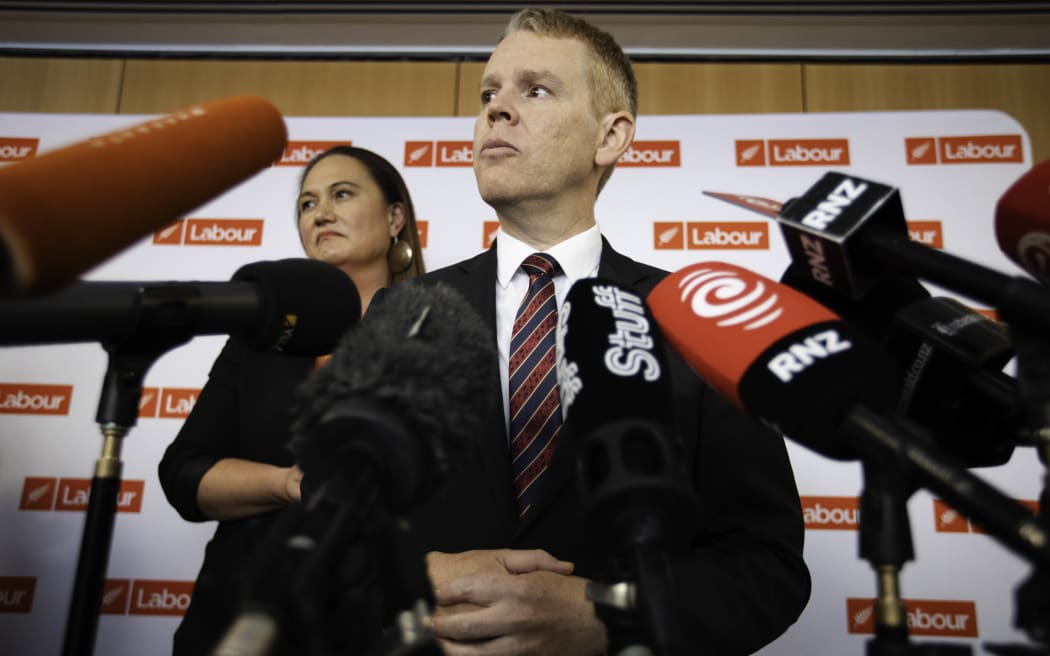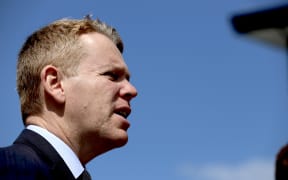
Chris Hipkins was endorsed as Labour Party leader on Tuesday, while Carmel Sepuloni took over as deputy leader. Photo: RNZ / Angus Dreaver
Labour Party leader Chris Hipkins says he does not think ruling out a capital gains or wealth tax earlier this year is what lost his party the election.
Hipkins told Morning Report he did not regret making a captain's call on a wealth or capital gains tax before the election and supports all the decisions his party took in the run-up to the election.
In terms of policy changes, Hipkins said nothing was off the table as his party "resets" under opposition.
"After an election loss you do need to go back to the drawing board and we need to accept the election in 2026 will be fought on very different territory to the election in 2023.
"So we start again our policy process and that means looking at things we might not have campaigned on in 2023 and it also means that the things we did campaign on in 2023 might not be part of our platform in 2026."
Labour would be revisiting all of its policy positions after the election loss but at this point nothing could be ruled in or out, Hipkins said.
The Labour Party's values would remain the same, he said.
Those values included an inclusive society with world class public services for health and education and making home ownership available to all, he said.
"These are value policies that have always informed the policies of the Labour Party but the specific commitments we make in terms of what we would do in government. Of course, three years from now they're going to be different to what they were in this election campaign."
Hipkins said Jacinda Ardern set out Labour's tax policy for the 2020 election campaign and that was followed through during the Labour government's term.
Labour was not able to get support to progress many of the issues raised by the Tax Working Group from its then support partners the Greens and New Zealand First, he said.
No Labour reshuffle until govt sworn in - Hipkins
Hipkins said he would not reshuffle the Labour team until the new government had been sworn in.
"Our existing ministers have a job to do between now and then of making sure you know that we're adhering to all of the caretaker conventions and I don't think reshuffling responsibilities during that time would be the right thing to do."
As well as Hipkins being endorsed as Labour Party leader on Tuesday, Carmel Sepuloni took over as deputy after Kelvin Davis had previously indicated he did not want to stay in the role.
Hipkins said the fact that the Māori caucus did not put up a deputy leader when Davis stood down was a reflection of the fact that Sepuloni had the unanimous support of the caucus.
"I think she's done a great job as our deputy prime minister and she's got real support among the whole of the Labour team to take up the role of deputy leader."
Hipkins demonstrating he can listen to voters - Moroney
Former Labour Party MP Sue Moroney said putting a capital gains tax back on the table showed Labour was returning to its values and principals.
Moroney said she was never in any doubt that Chris Hipkins would retain the leadership.
Keeping virtually the same leadership team in place was the right thing to do and Hipkins still had the backing of his caucus, she said.
"But he's signalled a major reset and I think that's also important given the size of the defeat they've suffered."
The issue of a capital gains tax had been an issue of considerable debate within the party and likely within the caucus as well, she said.
In terms of Hipkins having previously ruled out a capital gains tax, Moroney said "smart leadership in a social democratic party is actually hearing the message from the voters".
Hipkins was demonstrating he was able to do that, she said.
Two thirds of the Labour caucus had never been in opposition which meant quite a steep learning curve for many of them, she said.
The fact that Labour did not stand on a capital gains tax or a social investment insurance scheme during the election may have been because a lot of their decisions were driven by focus groups of swing voters, Moroney said.
"The issue with swing voters is they actually don't know what they stand for and if you start to develop your policies around their views and their thinking then you also as a party start to look like you don't know what you stand for."
This Labour caucus was quite different than the one prior to the election, not only was it smaller but half of the Labour Party caucus were now list MPs, she said.
She said that meant that Labour would now have far fewer resources. It came off the back of the largest caucus Labour had ever had in the history of the Labour Party and the large amount of parliamentary resources that brought, she said.
"I think on a range of levels it's a major reset, they're going to have to think very smartly about how they organise their resources."



